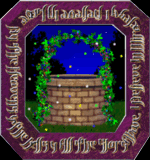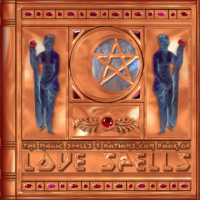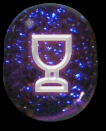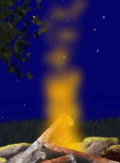Sloe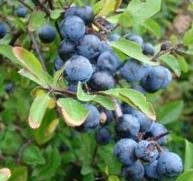
The term Sloe, or Sla, means not the fruit but the hard trunk, being connected with a verb signifying to slay, or strike, probably because the wood of this tree was used as a flail, and nowadays makes a bludgeon.
Added Dec 1, 2010
| 5,615 Reads
The parent tree which produces the Sloe is the Blackthorn, our hardy, thorny hedgerow shrub (Prunus spinosa), Greek Prounee, common everywhere, and starting into blossom of a pinky white about the middle of March before a leaf appears, each branchlet ending in a long thorn projecting beyond the flowers at right angles to the stem. From the conspicuous blackness of its rind at the time of flowering, the tree is named Blackthorn, and the spell of harsh unkindly cold weather which prevails about then goes by the name of "blackthorn winter." The term Sloe, or Sla, means not the fruit but the hard trunk, being connected with a verb signifying to slay, or strike, probably because the wood of this tree was used as a flail, and nowadays makes a bludgeon. In the Autumn every branch becomes clustered with the oval blue-black fruit presently covered with a fine purple bloom; and until mellowed by the early frosts, this fruit is very harsh and sour. The leaves, when they unfold late in the spring, are small and narrow. If dried, they make a very fair substitute for tea, and when high duties were placed on imported tea, it was usual to find the sloe trees stripped of their marketable foliage. Furthermore, the dark ruby juice of Sloes enters largely into the manufacture of British port wine, to which it communicates a beautiful deep red colour, and a pleasant sub-acid roughness. Letters marked upon linen fabric with this juice, when used fresh, will not wash out. If obtained by expression from the unripe fruit, it is very useful as an astringent medicine, and is a popular remedy for stopping a flow of blood from the nose. It may be gently boiled to a thick consistence, and will then keep throughout the year without losing its virtues. Winter-picks is a provincial name for the Sloe fruit, and winter-pick wine takes the place of port in the rustic cellar. The French call them Prunelles. Sloe-blossoms make a safe, harmless, laxative medicine. To use these, "Boil them up, and drink a cup of the tea daily for three or four days; it will act gently, painlessly, but thoroughly." The syrup is especially useful for children. Country people bury the Sloes in jars to preserve them for winter use; and the bush which bears this fruit is sometimes called, provincially, Scroggs. Sloes may be gathered when ripe on a dry day, picked clean, and put into jars or bottles, without any boiling or other process, and then covered with loaf sugar; a tablespoonful of brandy should presently be added, and the jar sealed. By Christmas, the syrup formed from the juice, the sugar, and the spirit, will have covered and saturated the fruit, and then a couple of tablespoonfuls will not only make an agreeable dessert liqueur, but will act as an astringent cordial of a very pleasant sort. In Somersetshire the Sloe is named Snag (as corrupted from "Slag," i.e., Sloe). The juice is viscid, and when thickened to dryness, is the German Gum Acacia. Those provers who have taken experimentally a tincture made from the wood and bark and leaves of the Blackthorn, all had to complain of sharp pains in the right eyeball and accordingly the diluted tincture is found, when administered in small quantities, to give signal relief for ciliary neuralgia, arising from a functional disorder of the structures within the eyeball. Dr. Hughes says: "It not only relieves such pains, but also checks the inflammation, and clears the vision." The medicinal tincture is made (H.) with proof spirit of wine from the flower buds collected in early spring before they expand. The Sloe has been employed as a styptic ever since the time of Dioscorides. "From the effects," says Withering, "which I have repeatedly observed to follow a wound from the thorns, I find reason for believing that there is something poisonous in their nature, particularly in the autumn." Next to the Sloe in order of development comes the Bullace (Prunus insititia), a shrub with fewer thorns, and bearing its flowers after the leaves have begun to unfold. The fruit is five times as big as the Sloe, but likewise of a delicate bluish colour. It is named from the Latin plural bullas, meaning the round bosses which the Romans put on their bridles. Lydgate (1440) used the phrase, "As bright as Bullaces," in one of his poems. In Lincolnshire the blossom is known as "Bully bloom," and the fruit are "Bullies." After harvest the women and children go out gathering them for Bullace-wine. Boys in France call Slot's "Sibarelles," because it is impossible to whistle immediately after eating them. Some writers say the signification of "Sloe" is "that which sets the teeth on edge." Finally comes the true Wild Plum (Prunus domestica), which is far less common than the two preceding sorts. Its flowers are large, and in small clusters, whilst the leaves unfold with the blossom. The fruit is a small brownish plum, intensely sharp and acrid to the taste, and the tree is thorny. Only in this latter respect does it differ from an inferior kind of garden plum of which the cultivation has been neglected. The cultivated Plum has been developed from the Wild Plum, and has been made to exhibit some fifty varieties of form and character. The fruit of Damascus was formerly much valued, being now known as Damascenes, (damsons), Damasin, or Damask prune. All the Wild Plums develop thorns; but the cultivated kinds have entirely cast them off. The Plum, as a fruit, was known to the Romans in Cato's time, but not the tree. "Little Jack Horner," says the familiar nursery rhyme, "sat in a corner, eating a Christmas pie; he put in his thumb, and he pulled out a plum, and said 'What a good boy am I.'" "Inquit, et unum extraheus prunum, Horner, quam fueris nobile pueris Exemplar imitabile"! When ripe, cultivated Plums are cooling and slightly laxative, especially the French fruit, which is dried and bottled for dessert. They are useful for costive habits, and may be made into an electuary; but, when unripe, Plums provoke choleraic diarrhoea. The garden fruit contains less sugar than cherries, but a large amount of gelatinising pectose. Dr. Johnson was specially fond of veal pie with plums and sugar. He taunted Boswell about the need of gardeners to produce in Scotland what grows wild in England. "Pray, Sir," said he, "are you ever able to bring the Sloe to perfection there?" On Change a hundred thousand pounds are whimsically known as "a plum," and a million of money is "a marigold." Lately a Chicago physician whilst officiating at a Reformatory found that the boys behaved themselves much better when taking prunes in their diet than at any other time. These act, he supposes, on certain organs which are the seats, and centres of the passions. From France comes the Greengage, named in that country (out of compliment to the Queen of Francis the First) La Reine Claude. It was brought to England from the Monastery of La Grande Chartreuse, about the middle of the eighteenth century, by the Rev. John Gage, brother to the owner of Hengrave Hall, near Coldham, Suffolk; and taking his name this fruit soon became diffused throughout England. French Prunes are conveyed to England in their dried state from Marseilles. With their pulp, figs, tamarinds, and senna, the officinal "lenitive electuary" is made; and apothecaries prepare a medicinal tincture from the fresh flower-buds of the Blackthorn. Culpeper says: "All Plumbs are under Venus, and are like women-- some better, some worse." In Sussex and some other counties, a superstitious fear attaches itself to the Blackthorn in bloom, because of the apparent union of life and death when the tree is clothed in early Spring with white flowers, but is destitute of leaves; so that to carry, or wear a piece of Blackthorn in blossom, is thought to signify bringing a death token.
Added Dec 1, 2010
| 5,615 Reads
Share The Magic ...
The GoE MONEY!!! Course - A Course In Real MONEY MAGIC!
|

